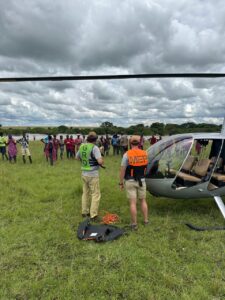To say that the Mara is wet, would be an understatement. The rains definitely came early to the Mara in March and they wanted to be heard! This created many very tricky transportation situations for our MEP rangers; however, the wildlife is extremely happy!
MEP Monthly Report March 2018
 MEP had a pet baby elephant for a day when we responded to a call from a camp that a baby elephant had been recovered from the overflowing Mara River and needed help. After providing care for the baby (pictured left) and unsuccessfully trying to locate its Mom, we needed to call in the experts, The David Sheldrick Wildlife Trust (DSWT), to take her to the orphanage in Tsavo. We wish her well.
MEP had a pet baby elephant for a day when we responded to a call from a camp that a baby elephant had been recovered from the overflowing Mara River and needed help. After providing care for the baby (pictured left) and unsuccessfully trying to locate its Mom, we needed to call in the experts, The David Sheldrick Wildlife Trust (DSWT), to take her to the orphanage in Tsavo. We wish her well.
The MEP intelligence unit received two new motorbikes in March just in time for the rain. These are much easier to navigate when a road is impassable, and they are more cost effective to use for our team.
Unfortunately, we reported three elephant deaths in March: one due to poaching and two as a result of conflict. The Mau Forest rapid response unit found an elephant carcass with the tusks hacked out, and as a result, engaged the local community to gather information on the poaching in the forest. This led to a second reported elephant carcass, but because of the thick forest MEP rangers weren’t able to access the area.
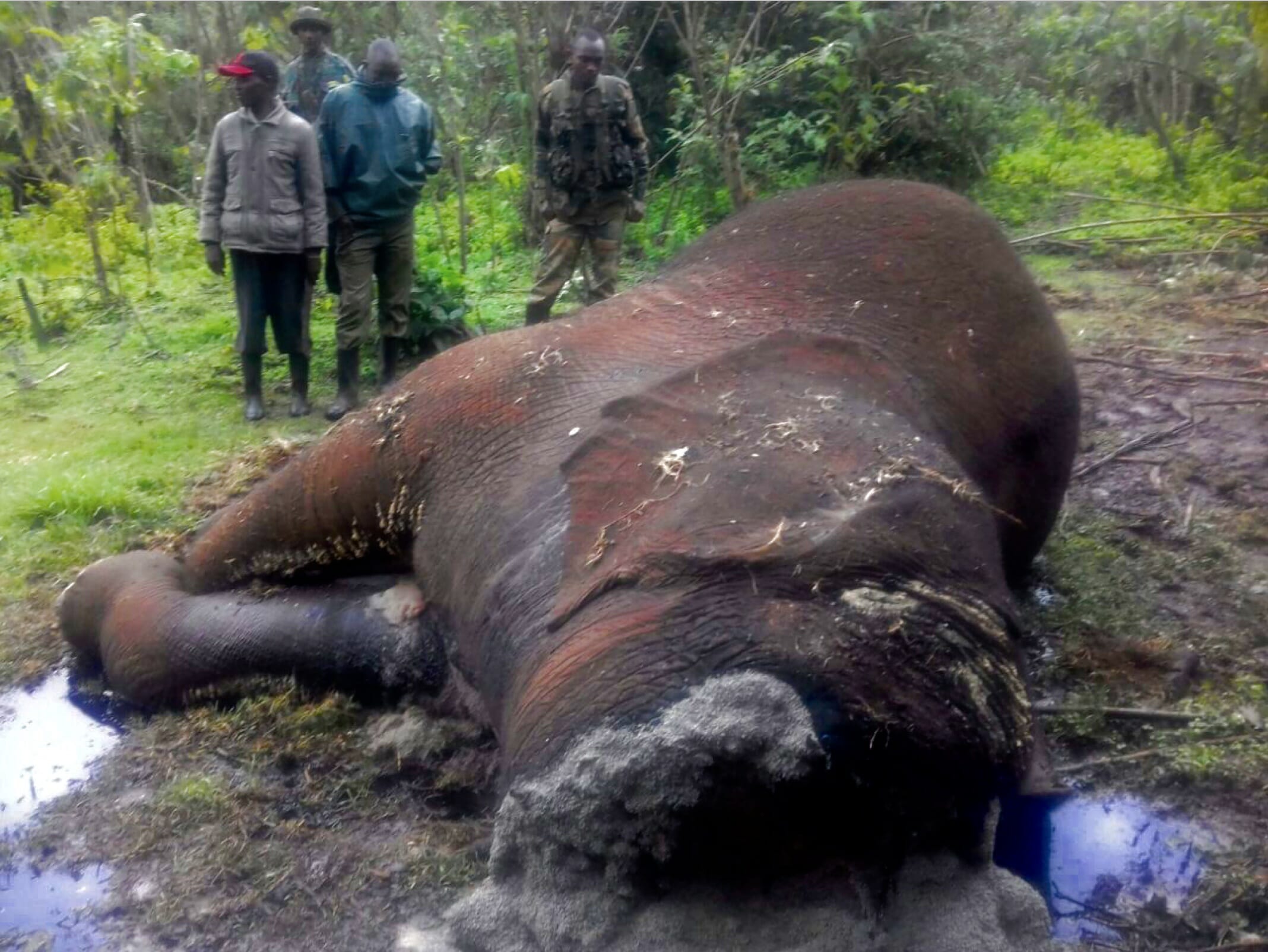
The elephant carcass found in the Mau Forest.
The second area of concern is Mosiro, where this month, two dead elephants were found near Suswa. It is suspected that they ate watermelons laced with poison and were the target due to conflict with people in the area. This area has very little security and is outside of MEP’s area of operations, so we will need to investigate how we can have more of a presence in Mosiro in partnership with the South Rift Association of Land Owners (SORALO). SORALO has asked MEP to conduct human-elephant conflict training for their rangers in the southern rift and we’re also working together to develop a partnership for better protection of the Loita Forest.
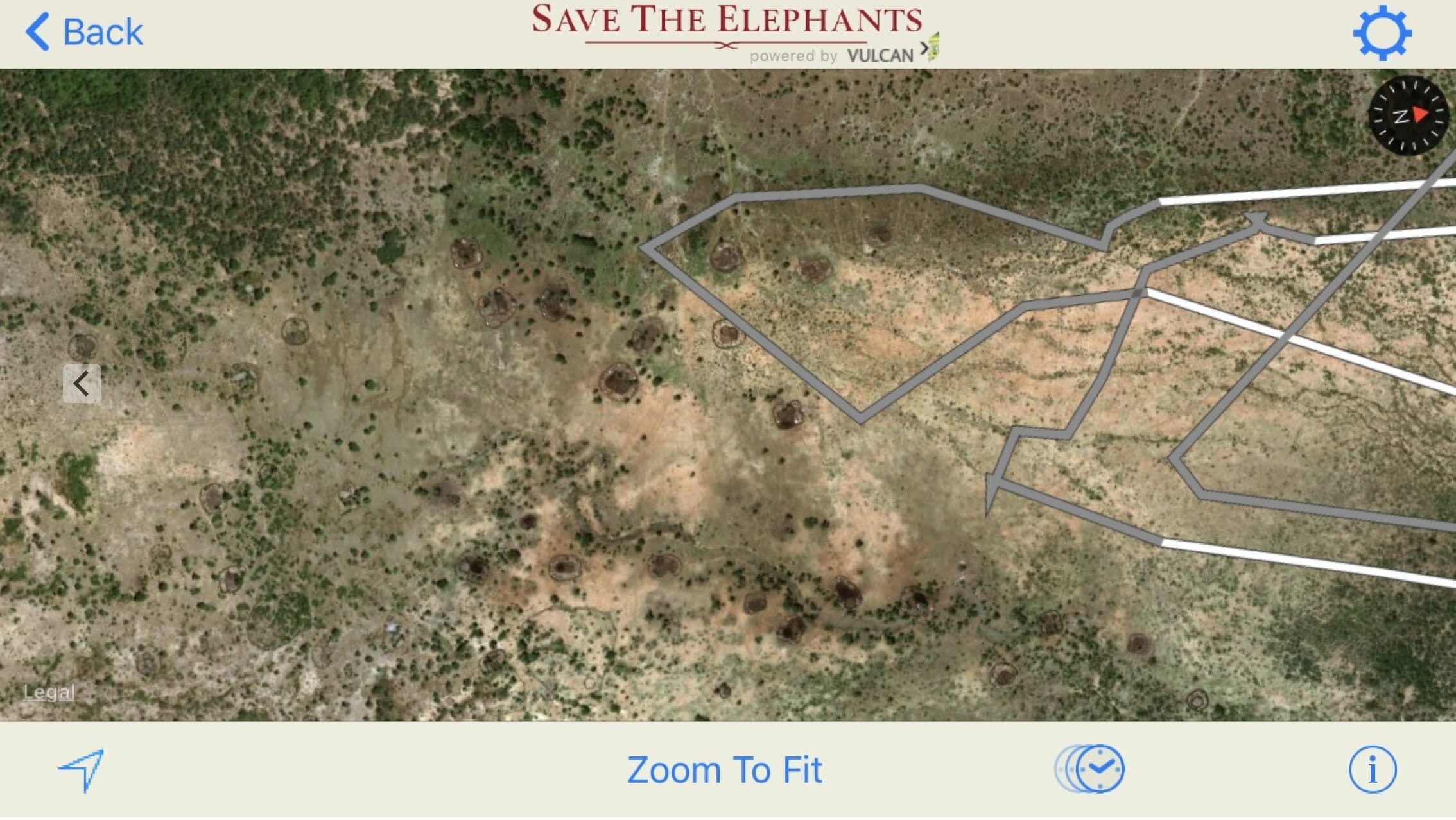
New collared elephant Julia’s movements shows her crop raiding behavior.
Some good news, we were able to collar an elephant in the Mosiro area, where we were seeing that increased human-elephant conflict. Through the generous connection of Tropic Air Kenya and Richard’s Camp, MEP was able to secure a donor to support the lifespan of an elephant collar. We ran a successful operation on March 7 and now have MEP’s 21st actively collared elephant, Julia, a breeding female with a herd of 20. The donor gave $26,000 for this effort and he and his daughter were able to join along in the operation.

MEP C.E.O. Marc Goss along with DSWT/KWS Vet Dr. Limo collaring Julia.
In other collared elephant news, on the 13th MEP got a red immobility alert from the Save The Elephants app on collared elephant Nancy in the Mau Forest. Unfortunately, when the DSWT Mau Forest patrol team tracked down Nancy they found her collar had broken off. Nancy was just collared in November 2017 so what this shows is a serious weakness of the collars in forest conditions. Since Nancy was the first elephant of her kind collared in the dense Mau Forest, these are lessons that MEP will be learning along the way. We are actively working on upgrading our collars before deploying more in the Mau and plan to re-collar Nancy in April; however, the data collected from her first five months was the first ever collected on elephant movements in the Mau Forest and is actively being used to inform ranger deployments.
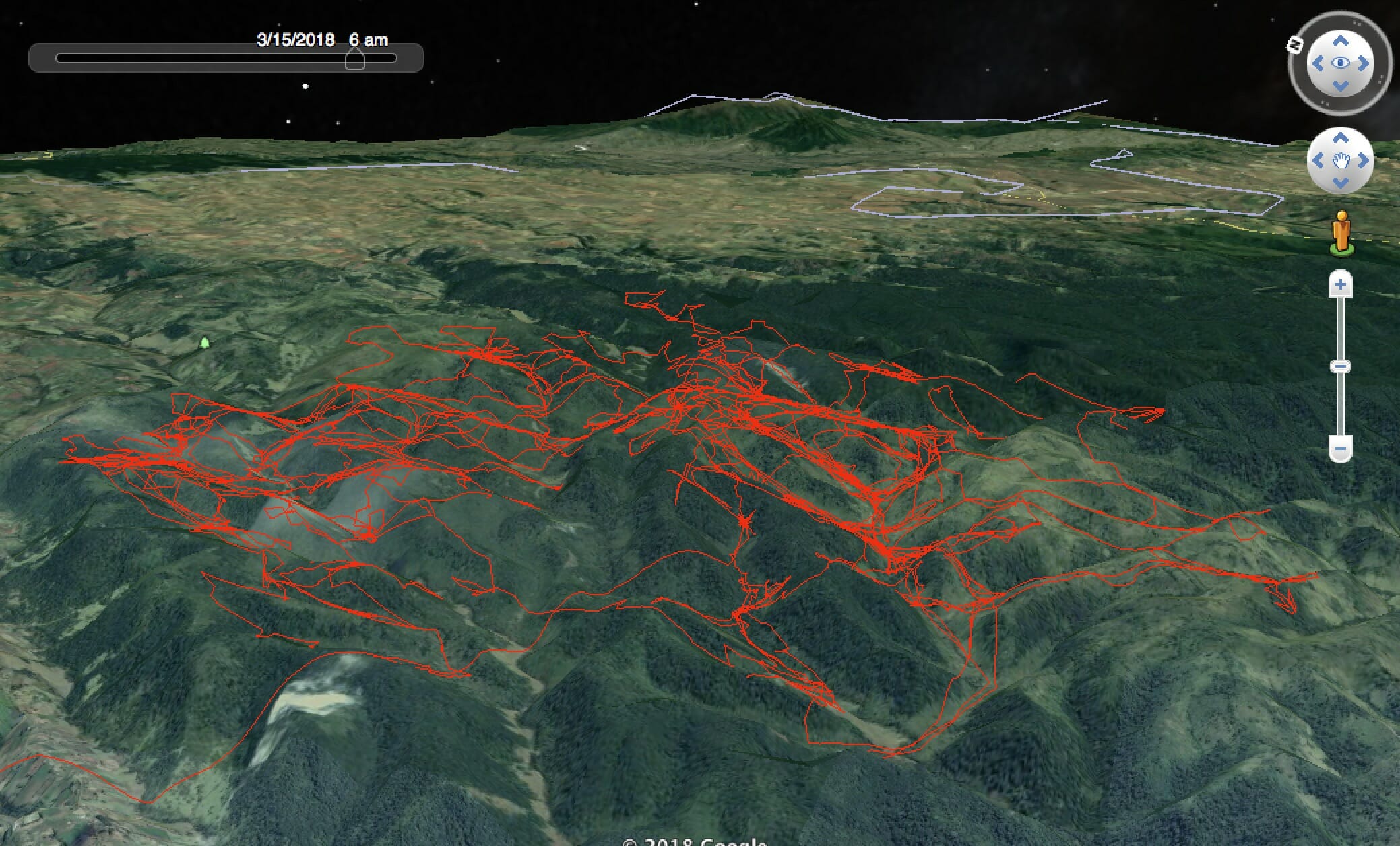
The first five months of Nancy’s movements in the Mau Forest.
The ongoing elephant poaching in the Mau Forest is troubling to say the least and we still do not know the extent of it in the forest due the rough terrain and the very large area. One of the main reasons for the decline in poaching in the Mara has been MEP’s close protection of elephants by following the individual herds in poaching areas. In the Mau this is more challenging, but we believe that well-equipped highly mobile teams will be able to do this.
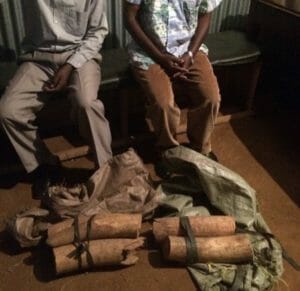
The intelligence unit had a notable success on the 30th when they arrested two middlemen with 17 kg of ivory (pictured left) on the Kenya/Tanzania border near the town of Isabania. The DSWT Mau Team continues to recover snares and more recently three poison-tipped drop spears that are used for killing elephants.
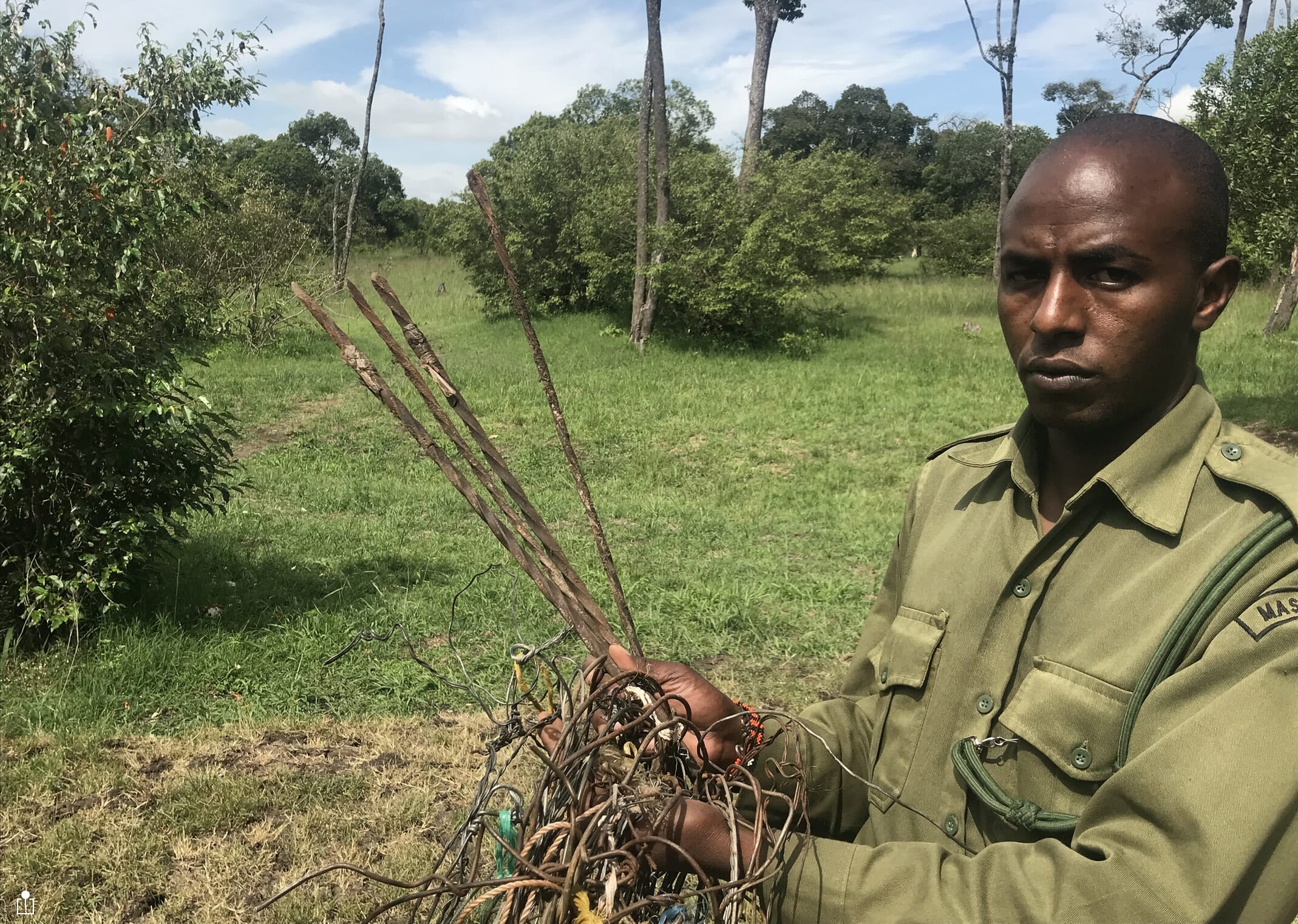 Poison tipped drop spears and snares recovered in the Mau Forest.
Poison tipped drop spears and snares recovered in the Mau Forest.
Kenya Wildlife Service (KWS) and MEP rangers had one arrest in March and the suspect was found with not only 3 kg of ivory but is also a motorbike driver for a gang wanted for armed robbery in nearby towns. KWS also arrested three suspects using MEP intelligence with 5 kg of ivory.
We responded to 12 human-elephant conflict incidents in March. We continue to experience a low level of conflict, but we expect that is about to change in June with large areas of land being planted with maize in Munyas and Transmara.
Other great fundraising news, besides the collaring of Julia, is that we received $1,800 from Elephanatics, a Canadian elephant advocacy group that’s founder member is Dr. Jake Wall. This was money raised in their 2017 march for rhinos and elephants. Additionally, in March, we had donations of over $750 from online Facebook fundraisers that supporters hosted in honor of their birthdays. This grassroots type effort is always heartwarming to see.
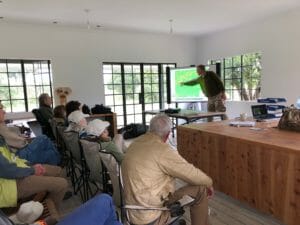 MEP is launching an HQ visitor program with camps around the Mara. We’ve had eight camps sign up so far that have taken our updated MEP pamphlets to pass out to guests and included the “MEP Visitor Experience” on their website or as a guest activity. Eco-tourism is something that is very new and exciting and MEP wants to be on the cutting edge of this trend. We’re offering a full MEP visiting experience for a $100 donation per adult, but we’re hoping this cultivates a larger support network moving forward. So far, we’ve had visitors from Richard’s Camp and we’ve had camp managers from Angama Mara, Alex Walker Serian and Kicheche stop by to run through the tour and experience what their guests will experience. We’ve also had several travel agencies based in Kenya that are now offering our experience. If you’re interested in more details, please contact Claire.
MEP is launching an HQ visitor program with camps around the Mara. We’ve had eight camps sign up so far that have taken our updated MEP pamphlets to pass out to guests and included the “MEP Visitor Experience” on their website or as a guest activity. Eco-tourism is something that is very new and exciting and MEP wants to be on the cutting edge of this trend. We’re offering a full MEP visiting experience for a $100 donation per adult, but we’re hoping this cultivates a larger support network moving forward. So far, we’ve had visitors from Richard’s Camp and we’ve had camp managers from Angama Mara, Alex Walker Serian and Kicheche stop by to run through the tour and experience what their guests will experience. We’ve also had several travel agencies based in Kenya that are now offering our experience. If you’re interested in more details, please contact Claire.
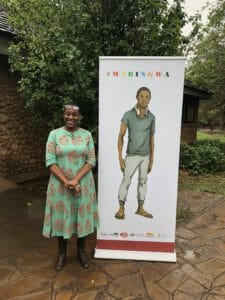
Finally, we are proud to call the ESCAPE Foundation our primary partner, as they just launched groundbreaking research on youth attitudes towards conservation and wildlife in Kenya. The launch of the research and film, MABINGWA/The Champions, was a huge success in Nairobi and MEP C.E.O. Marc Goss and Trustees Beatrice (pictured left) and Moses attended to network for MEP at the event. It was a pleasure to be a small part in such a big shift in attitudes toward conservation and wildlife in Kenya.
Understanding Young People’s Attitudes Towards Wildlife and Conservation
